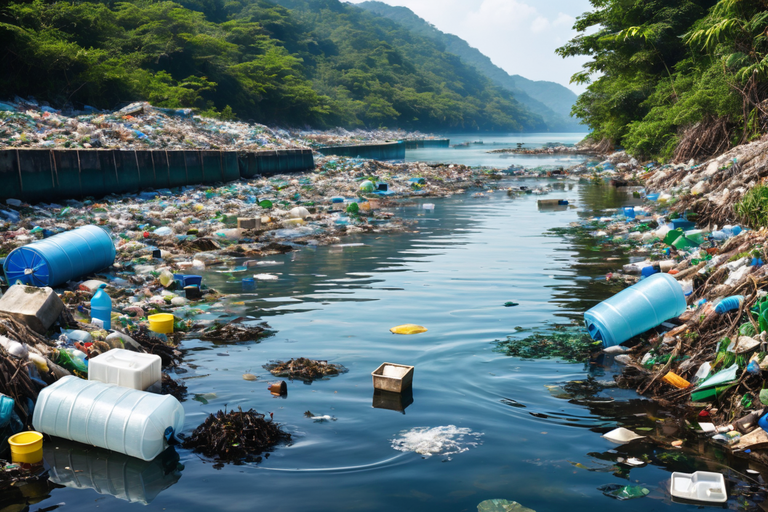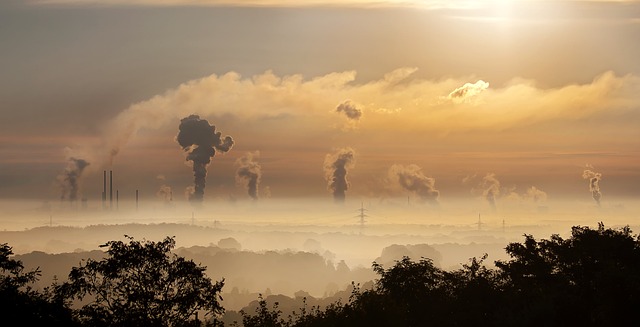Image by Foto-RaBe
In today’s rapidly industrializing world, pollution has become a pressing issue that affects every aspect of our lives. From the air we breathe to the water we drink and the food we eat, pollution poses a significant threat to our health and the environment. This article aims to shed light on the importance of maintaining clean air, water, and food, and the role pollution plays in jeopardizing these essential resources. By exploring various forms of pollution, such as air, food and water pollution, the impact of big oil and toxic chemicals, the significance of renewable energy and education, and the consequences of climate change, pesticides, and microplastics, we can better understand the urgency of protecting our environment.
Air Pollution
Air pollution is a growing concern worldwide, with detrimental effects on human health and the environment. The emission of harmful gases and particulate matter from industrial activities, vehicle exhausts, and the burning of fossil fuels significantly degrades the quality of the air we breathe. These pollutants, such as carbon monoxide, sulfur dioxide, and nitrogen oxides, contribute to respiratory diseases, cardiovascular problems, and even premature death. To combat air pollution, it is crucial to promote renewable energy sources, such as solar and wind power, and reduce our reliance on fossil fuels.

What can we do about air pollution?
Air pollution is a pressing issue that affects not only our health but also the health of the planet. It is crucial that we take action to keep the air we breathe clean and healthy. So, what can we do about air pollution? The answer is: a lot! Foremost, we need to educate ourselves and raise awareness about the causes and effects of air pollution. By understanding its sources, such as industrial emissions, vehicle exhaust, and burning of fossil fuels, we can make informed decisions and take necessary steps to reduce our own contributions.
One of the most effective ways to combat air pollution is to reduce our reliance on fossil fuels. By implementing cleaner energy alternatives like solar, wind, and hydroelectric power, we can significantly decrease the amount of pollutants emitted into the atmosphere. Similarly, opting for electric vehicles or carpooling instead of driving alone can significantly reduce vehicle emissions. Even small changes, such as taking public transportation or biking instead of driving, can make a notable difference if adopted by a large number of individuals.
Another important step we can take is to support policies and initiatives that promote environmental protection. This can include advocating for stricter regulations on industrial emissions, supporting clean energy initiatives, and encouraging sustainable urban planning. By voicing our concerns and demanding action from our governments and businesses, we can create an environment that prioritizes the health and well-being of its citizens.
Individual actions can also have a significant impact on air quality. Conserving energy by turning off lights and electronics when not in use, using energy-efficient appliances, and properly insulating our homes can reduce the demand for electricity and subsequently the pollution caused by its generation. Planting trees and creating green spaces in our communities not only helps absorb pollutants but also provides us with cleaner and fresher air to breathe.
It is crucial that we take action to keep the air we breathe healthy. By educating ourselves, reducing our reliance on fossil fuels, supporting environmental initiatives, and making individual changes, we can all contribute to tackling air pollution. Remember, every action counts, and together, we can make a positive difference. So let’s stand up for clean air and create a future where breathing is safe and refreshing for all.

Water Pollution
Water pollution is another critical issue that affects both human beings and aquatic life. Industrial waste, agricultural runoff, and improper disposal of chemicals contaminate our water sources. Toxic chemicals and toxins, including heavy metals and pesticides, find their way into rivers, lakes, and oceans, posing a severe threat to the ecosystem and the quality of our drinking water.
What can we do about water pollution?
To address water pollution, stricter regulations on industrial waste disposal, sustainable farming practices, and better wastewater treatment are necessary.
Water is an incredibly precious resource that is essential for our survival, and it is our responsibility to take care of it. Unfortunately, water pollution has become a major issue, and it is affecting the quality of the water we drink. However, there are several steps that we can take to combat water pollution and ensure that the water we drink remains healthy.
First, we need to raise awareness about the importance of water conservation and pollution prevention. We can do this through educational campaigns and community outreach programs, as well as by teaching children about the value of water and the effects of pollution. By spreading knowledge and understanding, we can inspire individuals to take action and make small changes in their daily lives to reduce water pollution.
Another crucial step is to properly manage and treat wastewater. Industries and households must implement effective wastewater treatment systems to remove pollutants before releasing water back into rivers and lakes. Additionally, governments should enforce stricter regulations and monitor industrial practices to prevent the illegal disposal of hazardous substances into water bodies. By holding industries accountable for their actions, we can significantly reduce water pollution and ensure the safety of our drinking water.
Adopting environmentally friendly practices in agriculture is vital for protecting water quality. Farmers can use organic farming methods, such as crop rotation and integrated pest management, instead of relying heavily on chemical fertilizers and pesticides that can end up contaminating water sources. By promoting sustainable agriculture, we can minimize the runoff of harmful chemicals and prevent them from entering our waterways.
Another effective solution is to promote the use of alternative sources of energy, such as solar or wind power. By reducing our reliance on fossil fuels, we can decrease air pollution, which is a major contributor to water pollution. Harmful emissions released from burning fossil fuels can settle on the ground and eventually reach water bodies, contaminating them. Investing in renewable energy sources not only helps to combat climate change but also plays a significant role in reducing water pollution.
Last, it is crucial to engage in regular water monitoring and testing to identify potential pollutants and take appropriate actions to mitigate their impact. By conducting regular water quality assessments, we can detect any contamination early on and implement necessary measures to prevent it from affecting our drinking water.
Water pollution is a serious issue that demands our immediate attention. By raising awareness, managing wastewater effectively, promoting sustainable agriculture, adopting renewable energy sources, and conducting regular water monitoring, we can all play our part in keeping the water we drink healthy. It is our duty to preserve this invaluable resource for ourselves and future generations. Remember, every small action counts, and together we can make a significant difference in combating water pollution and ensuring the availability of clean and safe drinking water for all.
Food Pollution
In the fast-paced world we live in today, it is becoming increasingly important for us to ensure that the food we consume is healthy and free from toxins. Food pollution has become a major concern as our industrialized food system has led to the contamination of our food with harmful chemicals and toxins. Using pesticides, antibiotics, and hormones in conventional farming practices has not only deteriorated the nutritional value of our food, but has also posed serious health risks to us. However, we can take charge of our health by adopting organic and sustainable food practices.
Organic food is the way to go if we want to keep our food healthy and free from toxins. It is produced without the use of synthetic chemicals, pesticides, or genetically modified organisms (GMOs). Organic farmers focus on working in harmony with nature, prioritizing soil health, and employing natural methods to control pests and weeds. By choosing organic products, we are not only safeguarding our health but also supporting environmentally friendly practices. Organic farming promotes biodiversity, conserves water and soil resources, and reduces pollution caused by chemicals. Additionally, organic food tends to be more nutritious as it contains higher levels of essential vitamins, minerals, and antioxidants.
What can we do to keep the food we eat healthy?
To ensure the food we consume is free from toxins, it is important for us to be mindful of our food choices. Choosing organic produce and products should be the first step in our journey towards healthier eating habits. Organic fruits, vegetables, and grains are readily available in many grocery stores and farmers markets. By opting for organic, we can be confident that we are consuming food that is pure and pesticide-free. Moreover, it is advisable to support local farmers and businesses that employ sustainable farming practices. This not only ensures a supply of fresh and nutritious food but also reduces the carbon footprint associated with transportation of food across long distances.
In addition to choosing organic, we can also take charge of our food by growing our own produce. Even if it is just a small vegetable garden or a few herbs on our windowsill, this not only provides us with fresh, organic food but also allows us to reconnect with nature. By growing our own food, we can take control of what goes into our bodies and reduce our reliance on mass-produced, contaminated food.
Food pollution is a serious issue that affects us all. However, by choosing organic, supporting sustainable farming practices, and growing our own food, we can take an active role in keeping our food healthy and free from toxins. Let’s make a conscious choice to prioritize our health and the health of our planet by opting for organic and sustainable food options. Our bodies will thank us, and so will future generations.
Pesticides and Microplastics
Using pesticides in agriculture, though aimed at increasing crop yields, has detrimental effects on the environment and human health. These chemicals contaminate soil, water, and food, posing risks to ecosystems and potentially leading to long-term health issues.
Similarly, the proliferation of microplastics, tiny plastic particles, in our water bodies and food chain has become a major concern. These particles not only harm marine life but also find their way into our bodies through the consumption of contaminated seafood. Strict regulations on pesticide use and the reduction of plastic waste are necessary to mitigate these issues.
Big Oil and Toxic Chemicals
The influence of big oil companies cannot be ignored when discussing pollution. The extraction, refining, and burning of fossil fuels release greenhouse gases, leading to climate change and air pollution.
Using toxic chemicals in industries, agriculture, and consumer products further exacerbates pollution issues. It is crucial to hold big oil corporations accountable for their environmental impact and promote the use of cleaner alternatives.
Understanding why some believe politicians and talk show hosts over climate scientists
Why do some individuals not want to enact regulations to keep the air we breathe, water we drink, and food we eat clean?
The role of vested interests from big oil corporations cannot be underestimated. These powerful entities have a clear economic incentive to downplay the urgency of addressing climate change and to promote their own business interests. They invest heavily in lobbying efforts, political campaigns, and public relations strategies to shape the narrative around climate change and cast doubt on scientific findings.
By funding think tanks and research institutes that produce industry-friendly studies, they contribute to the creation of alternative narratives that challenge the consensus of climate scientists.
Unfortunately, many charismatic politicians and media hosts are part of the playbook to downplay climate change as they profit from Big Oil through payments, stock, elaborate vacations, and gifts.
Renewable Energy and Climate Change
Renewable energy plays a pivotal role in reducing pollution and combating climate change. Transitioning from fossil fuels to renewable sources, such as solar, wind, and hydroelectric power, can significantly decrease greenhouse gas emissions and air pollution. Investing in renewable energy infrastructure and supporting sustainable practices are essential steps towards a greener future.
Learn more about renewable energy
Education for a Sustainable Future
Education plays a crucial role in raising awareness and driving positive change. By educating individuals about the consequences of pollution and the importance of sustainable practices, we can foster a generation committed to protecting the environment. Implementing environmental education programs in schools and promoting sustainable lifestyles can empower individuals to make informed choices that contribute to cleaner air, water, and food.
Protecting the Environment
To protect our environment and ensure clean air, water, and food for future generations, collective action is imperative. Governments, industries, and individuals must work together to enforce stricter regulations, invest in renewable energy, promote sustainable practices, and reduce pollution. By prioritizing the preservation of our environment, we can create a healthier and more sustainable world.
Final Thoughts
Pollution poses a significant threat to the air we breathe, the water we drink, and the food we eat. The impact of air pollution, water pollution, big oil, toxic chemicals, toxins, climate change, pesticides, and microplastics cannot be ignored. It is crucial to prioritize the adoption of renewable energy, stricter regulations, sustainable practices, and education to combat pollution effectively. By doing so, we can protect our environment, safeguard our health, and ensure a sustainable future for generations to come.

What are your thoughts on Pollution?
We encourage members to leave helpful advice for we can all contribute and learn from one another.
Together, we can make a positive difference!
Let’s Co-Create a beneficial page about Protecting this beautiful planet from Pollution to help humanity thrive.






Why it’s Important to Keep the Air We Breathe, the Water We Drink, and the Food We Eat Clean?
The air we breathe, the water we drink, and the food we eat are essential elements of our existence. They sustain our bodies and provide us with life-sustaining nourishment. However, in today’s world, pollution kills both our planet and ourselves. It is crucial that we recognize the importance of keeping these vital resources clean for the sake of our health and future generations.
One of the biggest threats to humanity is climate change, which is primarily caused by pollution. The release of greenhouse gases into our atmosphere from various human activities leads to rising global temperatures and extreme weather events. These changes have devastating consequences on ecosystems and biodiversity.
Imagine a world where the devastating effects of pollution are a thing of the past. Picture a utopian paradise nestled within the embrace of nature, where a cascading waterfall lagoon invites us to immerse ourselves in its crystal clear waters. Envision restrooms and showers seamlessly integrated into the landscape, designed to minimize our environmental footprint. And let’s not forget the enchantment of a tree house village, where we can reconnect with our childhood dreams and live harmoniously with the surrounding forest. This vision might seem like a distant dream, but it is within our grasp if we seize the opportunity to make it a reality.
Science has made it abundantly clear that we are at a pivotal moment in the fight against climate change. The very future of our planet hangs in the balance, and it is up to us to take transformative action. We cannot afford to turn a blind eye to the harsh realities we face. This is why we must rise above the challenges and join hands in building an ecovillage paradise that sets an example for the rest of the world. We possess the knowledge, the resources, and the determination to create a sustainable haven that will inspire future generations.
It is true that vested interests from big oil and other industries have long held a stronghold on our energy systems. They have profited from the exploitation of our natural resources, often at the expense of our environment. But now, the tides are turning. We are witnessing a global awakening, a powerful movement demanding change. As individuals, we hold the power to break free from the chains that bind us to unsustainable practices. By embracing renewable energy sources and adopting eco-friendly technologies, we can challenge the status quo and pave the way for a greener future.
Let us unite and pool our resources, both financial and intellectual, to bring this ambitious vision to life. Together, we can design state-of-the-art water treatment facilities that ensure the preservation of our precious waterfall lagoon. We can develop innovative ways to harness solar and wind power, reducing our reliance on fossil fuels and leaving a legacy for generations to come. And we can use sustainable materials and construction techniques in the creation of our tree house village, ensuring that we live in harmony with the natural world around us.
With each step we take towards this ecovillage paradise, we become agents of change, bridging the gap between imagination and reality. We have the opportunity to create a haven where the delicate balance between humanity and nature is respected and nurtured. So let us join forces, let us dream big, and let us work tirelessly to build a future that is not just sustainable, but truly thriving. The time for action is now, and together, we can turn this vision into a breathtaking reality. We have the power to shape a world where paradise is not just a dream, but a way of life. Let us unite and make it happen!